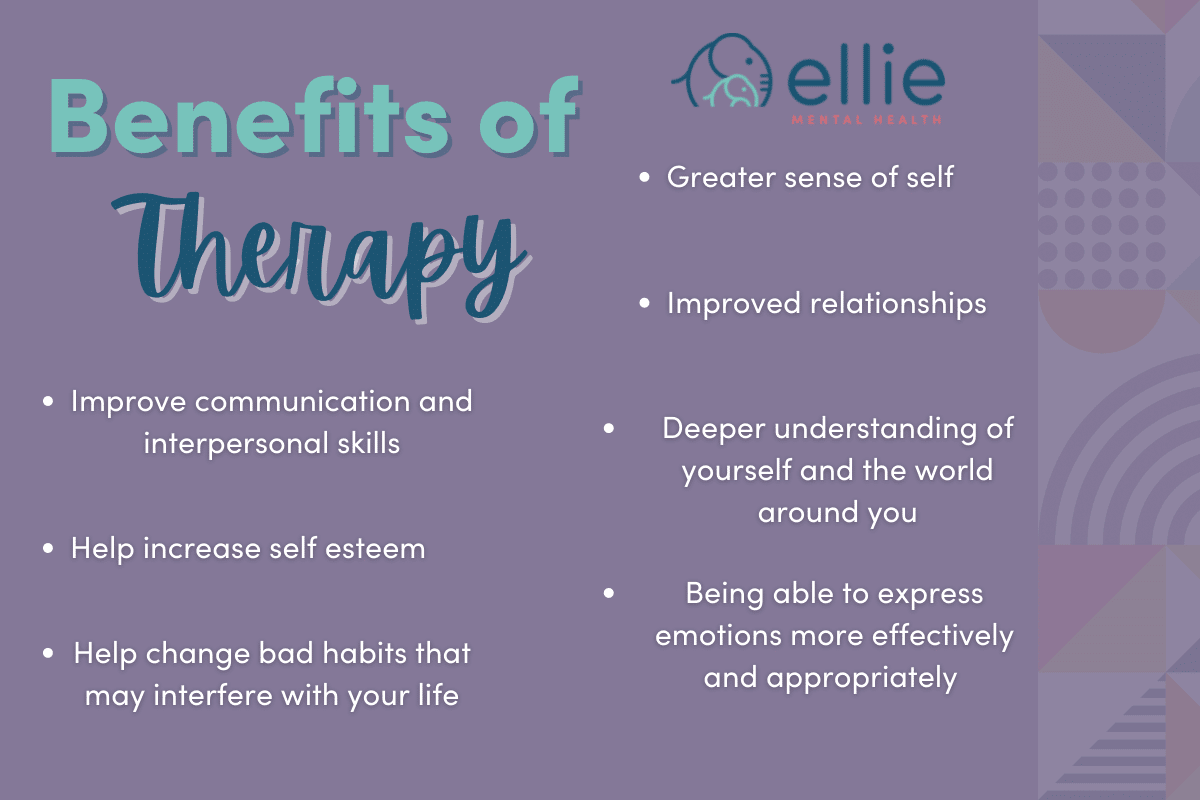Many of us have thought at some point, “I don’t need therapy” for one reason or another. We may believe that we have it all figured out and can handle it on our own, maybe we have an awesome support system, or things are just overall fantastic. We may also think that our problems aren’t all that bad. I mean, it’s totally normal to have a bad day, right? We can easily come up with a million excuses as to why we don’t need therapy. But I’m here to tell you why therapy may be an awesome choice for you and all of the benefits that therapy has to offer, even when you are feeling like you have it all together.
Benefits of Therapy…
You may be asking yourself, “I don’t think I struggle with mental health symptoms and I don’t have any diagnoses, so why would I go to therapy?” Well, did you know therapy can help to:
- Improve communication and interpersonal skills
- Increase your self-esteem
- Improve your ability to change bad habits that interfere with your life
- Express your emotions more effectively and appropriately
- Achieve a greater sense of self
- Improve your relationships
- Gain a better understanding of yourself and the world around you
And let’s be honest… who doesn’t want to be a better version of themselves?! Are there things in your life that you have always wanted to do or accomplish, but simply can’t seem to get there? Therapy can help with that! Seeing a therapist can help you walk through everything going on in your head to determine how to reach your highest potential.

But I have the best support system…
You might say, “I have a great support system. I have friends and family that I can go to when I am needing help or advice.” Having a support system is fantastic, but there’s a downside.
- The people involved in your support system are biased; they know details of your life and know the other people in your life.
- They approach your situations with emotions and are not always logical. Have you ever gone to someone in your support system and didn’t get what you needed from them? Yeah, me too. It’s hard to tell those in your support system what you need and how you need it. Sometimes we get advice when all we want to do is vent or we just need validation. Sometimes we never even get validation. When are feelings don’t get validated we often feel worse than before we went to our support system.
Not to mention, your support system is busy! They have their own lives and their own struggles. While is it so crucial to have a support system in your life, your therapist will always have time just for you.
When you attend therapy, your therapist is meant to be your non-biased supporter. They are there to support you and to provide you with knowledge and tools to create a better life for yourself. Your therapist can provide you with an outside perspective, with rational responses. Your therapist is meant to tailor each session to your needs; together you will create goals and a plan to achieve exactly what you are seeking, whether it’s better coping skills or a place to feel safe to discuss everything going on in your life.
But I don’t have a mental health diagnosis…
If you’re thinking, “I’ve never been diagnosed or even been seen by a mental health provider”, that’s okay… we all start somewhere! Scheduling an intake for therapy gives us a starting point to begin the journey and process. As humans, we don’t have all the answers, so we go to others. We talk to our friends and families about our problems, stress, and happiness. So, what’s wrong with talking to a therapist? Yes, there is stigma, unfortunately. But why? Why do we think it is such a bad thing to add another person to our support system? The answer to that question is too complex to unpack right now, but the stigma exists. We shouldn’t be judged because we seek to be a better version of ourselves. Therapy provides that for us. Therapy isn’t always about addressing a mental illness; it’s about addressing how we can improve our lives and reach our highest potential. Gone are the days of laying down on a couch and someone asking you “how does that make you feel?” Yes, therapists care about how you feel, but that’s not all we care about. We care about you, your goals, your behaviors and patterns, and most importantly how we can help.
Your environment plays a part
Still not convinced? Have you ever been told “you sound just like your mother/father”? Or suddenly you say or do something and realize that’s exactly what your parents/guardians do or did? That’s because we learn from our parents/guardians. The people who raise us teach us how to interact with others, how to express our emotions, how to handle conflict, and so on. Our parents or guardians aren’t always the best role models for us. They may struggle to handle conflict and we may eventually learn to avoid conflict in our relationships. We may have been taught to just suck it up and not talk about our emotions (remember that stigma we talked about?) and eventually the emotions bottle up and we express them in unhealthy ways. It’s not their fault; they learned from their role models just like we learn from them. If they never learned healthy ways to approach things in life, how can we expect them to teach us? We must break generational patterns to create change and be better versions of ourselves. This does not mean our families are filled with bad people; they are just repeating what they have learned and doing what they believe is best.
So where do I start?
By now maybe you’re thinking, “where do I start? How do I find a therapist?” Well, you’re in the right place!
- Google is a great resource. You can search for specific things in your area based on what you are needing help with.
- There are websites that you can access, such as Psychology Today, that allow you to filter by specialty, gender, location, etc.
- You can also call the number on the back of your insurance card to see who is in network with your insurance. Not a fan of talking on the phone? Most insurance providers now offer the ability to search through an online directory as well.
- Facebook also has discussion groups where people can recommend therapists or clinics. The best part is the first therapist you choose doesn’t have to be your final choice.
Remember, you have a voice when it comes to finding the right fit. You have every right to do what’s best for you. Some therapists even offer free 15-30 minute consultations to determine if you are the right fit for each other.
You found a therapist…now what?
Wahoo! You decided maybe therapy won’t be so bad after all, and you’ve found yourself a therapist…now what? Typically…
- You will schedule an intake appointment with the therapist that you have chosen.
- You will be given paperwork (whether in office, mailed to you, or electronically) to fill out about yourself and consent to begin therapy and bill you and/or your insurance.
- You show up to your first appointment. High five yourself! Showing up is the hardest part! Have an open mind and trust the process. It’s okay to be nervous, it’s okay to be excited, it’s okay to be anxious. Just show up as you.
- Sit down in your therapist’s office (or in your comfy chair at home via if your appointment is virtual) and breathe!
- Your therapist will go over important policies and procedures that apply to them/their clinic, as well as confidentiality of your sessions.
- Now comes the fun part; you get to talk about yourself (just kidding, this is probably everyone’s least favorite part). Your therapist will go through an intake with you; asking questions about current stressors and symptoms, your family, your job, education history, major life events, hobbies, medical history, family mental health and medical history, and so on. The point of the intake is to gather information to create the foundation of who you are.
Once the intake is complete and you and your therapist have your foundation, therapy continues. Typically, most people attend therapy once per week, at least to start. During these sessions you dive deeper into the things that are going on in your life or have happened in your life. Your therapist helps to guide you through the process. They help you to build coping strategies and create that better version of yourself.
Change is difficult. Opening up to someone new can be scary. Admitting we need help is hard. But what’s even harder is not reaching our full potential, not achieving our goals, not living the best possible life you can. So… what are you waiting for?! Give therapy a try! We won’t force you to stay, but we would LOVE to have you… and we at Ellie are pretty cool!


